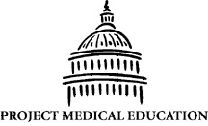
Nearly 40 legislators and legislative aids from the state of Michigan will gather this week for Project Medical Education, a program developed to showcase the value of medical education to Michigan 's health-care system.
The program, a partnership of the Wayne State University School of Medicine and the Southeast Michigan Center for Medical Education, will be Thursday, Feb. 24, and Friday, Feb. 25, at the School of Medicine as well as several area SEMCME hospitals, which train WSU residents.
Project Medical Education is designed to provide policymakers with an accurate background that will empower them to make sound decisions about Graduate Medical Education; these decisions, in turn, affect Michigan 's medical schools, affiliated teaching hospitals and the people they serve. As part of the two-day event, legislators participate in on-site learning experiences that illustrate the critical value of supporting the educational environment within the health-care system.
Project Medical Education will kick off with dinner and medical education presentations at WSU School of Medicine's Elliman Clinical Research Building on Thursday. On Friday, legislators will visit participating SEMCME hospitals to experience a day in the life of a medical resident. Legislators will get a first-hand look at things like a medical resident's clinical "morning report," clinic patient schedule and rounds. Legislators will have a chance to personally interact privately with medical students and residents, to ask them questions and to hear about their concerns.
Project Medical Education will be comprised of, but not limited to, several central themes:
• In-state physician training and retention: Two-thirds of the physicians that receive their medical education from the WSU School of Medicine remain in-state to practice, most in SEMCME medical facilities;
• Resident provision of medical care: Medical residents play a crucial role in the delivery of medical care, especially for under-insured and uninsured patients. In addition, Project Medical Education will educate legislators on the other key roles that residents play, such as in teaching, research and community service; and
• Funding issues for graduate medical education: How is medical residency education (and undergraduate medical education) funded? What is the debt load expected upon completion of residency? What are the personal challenges for medical students and residents?
SEMCME hospitals participating in Project Medical Education include Henry Ford Hospital , North Oakland Medical Center , Oakwood Hospital , Providence Hospital , St. John Hospital , St. Joseph Mercy Oakland Hospital , William Beaumont Hospital , and eight hospitals in the Detroit Medical Center.